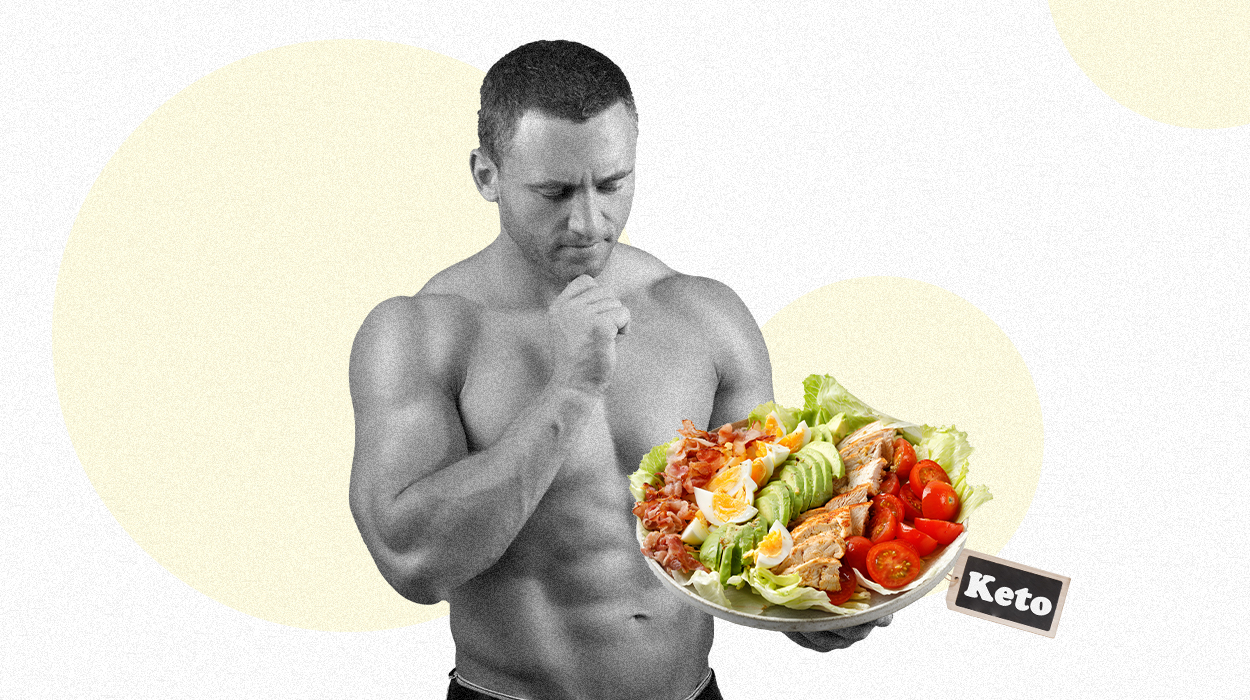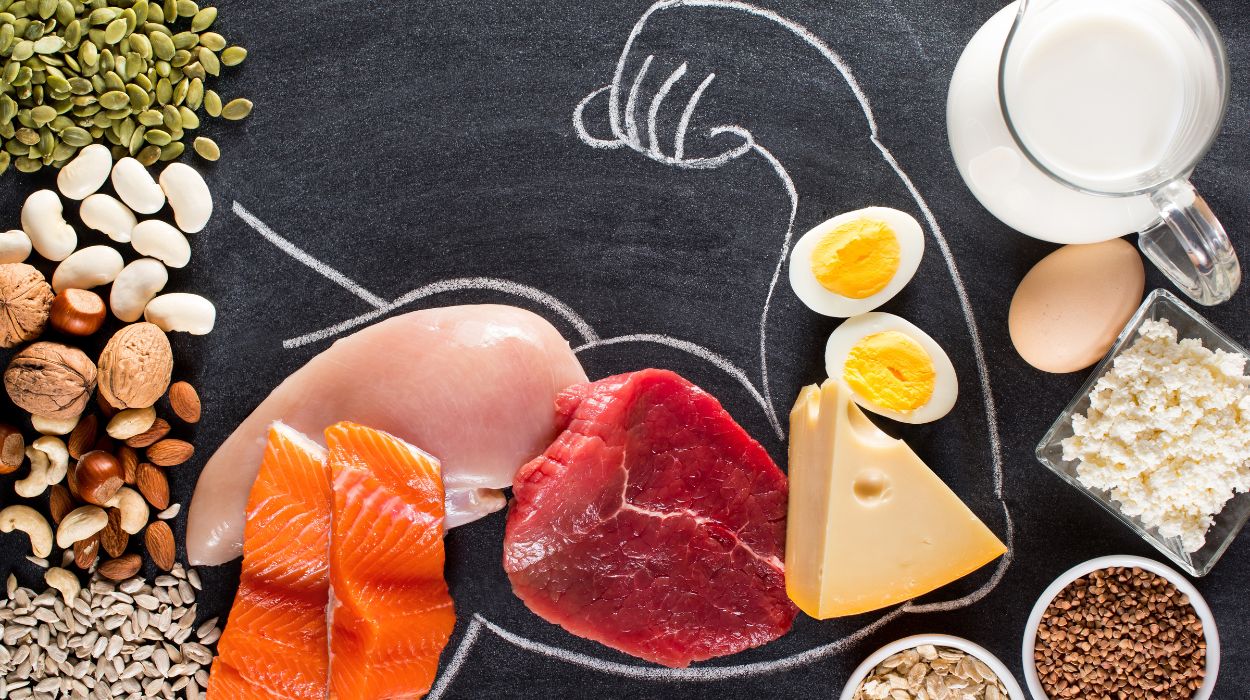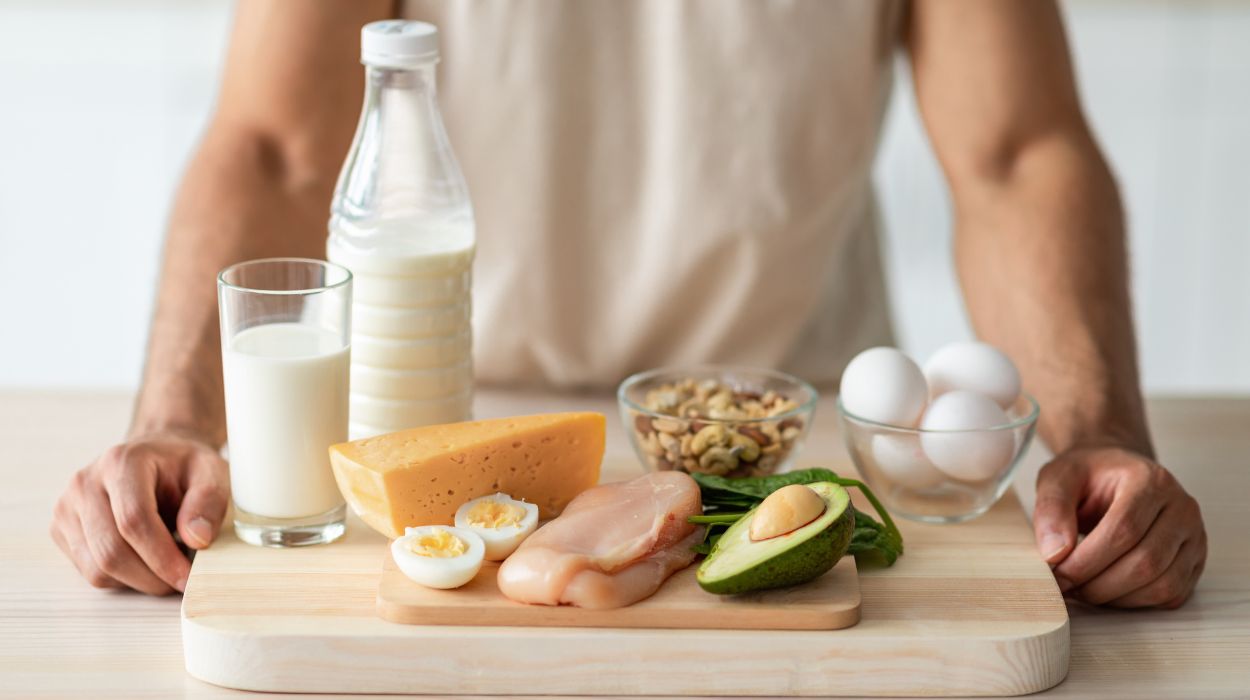 Expert's opinion
Expert's opinion
Expert's opinion
The article is a subjective view on this topic written by writers specializing in medical writing.
It may reflect on a personal journey surrounding struggles with an illness or medical condition, involve product comparisons, diet considerations, or other health-related opinions.
Although the view is entirely that of the writer, it is based on academic experiences and scientific research they have conducted; it is fact-checked by a team of degreed medical experts, and validated by sources attached to the article.
The numbers in parenthesis (1,2,3) will take you to clickable links to related scientific papers.
Can You Build Muscle On Keto? 2024 Tips For Keto Bodybuilding

The ketogenic diet, or “keto” for short, is a low-carb, high-fat diet that has been used in various medical capacities. From treating epilepsy to helping manage diabetes to helping individuals lose weight, the ketogenic diet has numerous uses. Keto can also be beneficial for bodybuilding, but it’s important to understand the diet’s limitations when it comes to building muscle mass. What’s equally important to remember while bodybuilding on a ketogenic diet is overall nutrition. Is broccoli a superfood? It certainly is. Consider adding more broccoli along with the best creatine supplements and leafy greens for juicing for keto bodybuilding success.
Keto For Bodybuilders: Is Gaining Muscle On Keto Easy?
It’s certainly possible to gain muscle while on a ketogenic diet, however, the ketogenic diet can pose more challenges for this goal than other diets. Muscle building is heavily reliant on protein,[1] which is somewhat limited on a ketogenic diet (not as much as carbs are limited, though). One would have to consider their protein intake, as well as their overall caloric intake, and their training regime in order to achieve their desired muscle gain.
Pros And Cons Of Building Muscle On Keto
Pros
- Maintain Muscle Mass: Maintaining muscle mass is a little more challenging to do on a keto diet compared with other diets, however, it’s achievable with the right tools. Namely, staying on top of fat and protein intake,[2] and monitoring the introduction of carbs, by strategically consuming them around workouts, to boost performance. Staying hydrated is also important.
- Fat Loss: By limiting carbohydrates, while at the same time increasing fats, the body has no choice but to burn fat for energy, instead of carbs. This process alone can help bodybuilders lose body fat and slim their figures.
- Stable Blood Sugar: Carbohydrates can spike blood sugar,[3] especially when eaten in excess and alone, without protein and fat in the meal to slow down the sugar’s absorption. By limiting carbs, the body is able to achieve more stable blood sugar levels – an important aspect for bodybuilders who need to avoid energy crashes.
- Better Focus: Fat is crucial for brain function,[4] and many individuals experience better clarity and mental focus on the keto diet, for this reason. Like any high-endurance sport, bodybuilding requires good focus, so a diet high in quality fats may be particularly beneficial.
- Less Inflammation: Eating less carbohydrates, especially heavily processed ones, has been associated with less inflammation. This is beneficial for almost anyone, as inflammation is at the root of many chronic diseases. However, it can benefit bodybuilders by way of better recovery after workouts and reducing muscle soreness.
Cons
- Decreased Athletic Performance: Carbohydrates are essential for strength and endurance,[5] if not at the very least, energy. For many people, decreasing carbs may also decrease their athletic performance.
- Metabolic Stress: A keto diet can put stress on the kidneys and other organs while the body adjusts to ketosis, burning fat instead of carbs. This metabolic state can also lead to calcifications or stone formations in the kidneys[6] which can lead to dehydration from electrolyte imbalance, putting the body in a state of less than optimal health.
- Loss of Muscle Mass: Muscle mass can be lost while on a keto diet, due to inadequate carb intake. The idea behind keto is for the body to burn fat instead of carbs, but sometimes the body breaks down muscle protein instead, a process known as gluconeogenesis,[7] which can deter muscle growth.
- Limited Glycogen Storage: The body naturally prefers carbs for energy, especially during exercise, but since the keto diet restricts carbs, glycogen can get stored in muscles, which can deplete energy and workout performance.
- Nutrient Deficiency: As with any restrictive diet, keto has the potential to cause nutrient deficiencies. Though carbs are supposed to be limited on a keto diet, this may cause an individual to miss out on their many nutrients (whole grain carbs contain essential vitamins, minerals, and fiber). Additionally, protein is also reduced on the keto diet, in favor of fat, so this can also make an individual miss out on amino acids and other nutrients from protein.
The Best Keto Foods For Bodybuilders

The best bodybuilding, keto-compliant foods are whole food-based sources of protein and healthy fat. Many times, we think of keto as a weight loss diet, but some of the same foods that can help promote weight loss are equally beneficial for muscle building. For example, it’s easy to use chia seeds for weight loss, just as it is easy to use coconut oil for weight loss, but these foods can also be included in a well-rounded bodybuilding keto diet. Here are some keto-friendly, bodybuilding favorites:
- Chia Seeds
- Nuts and Seeds
- Avocado
- Coconut Oil and Olive Oil
- Protein Powder
- Full-fat dairy Yogurt
- Low-carb veggies, including Leafy Greens, Cabbage, and Broccoli
- Eggs
- Herbs and Spices
- Lean Meats
- Fatty Fish
- Low-Glycemic Fruits, such as Berries
Determine Calories & Macros For Bodybuilders
There’s no single way to determine the right amount of calories and macros for bodybuilding – it’s highly individual. Your unique goals, metabolism, and body composition will help shape what is “right” for you. You can follow the following general guidelines to determine the right amount of calories and macros for you:
Know Your Total Daily Energy Expenditure (TDEE) And Adjust Your Calories:
Your TDEE is an estimate of the calories you’ll need to consume in order to maintain your weight. Use an app or online calculator to help you find out your TDEE. From there, you can adjust your caloric intake as needed. As a general rule, to build muscle mass, you’ll need to consume a calorie surplus, or extra calories (between 250-500 calories).
Establish Your Protein And Fat Intake:
There’s no way to build muscle without carbs and protein. Protein is essential for not only muscle growth but repair, as well. Bodybuilders[8] will want to consume between 1.6-2.2 grams of protein per kilogram of body weight per day. As for fat, a bodybuilder will want to ensure that between 20-30% of daily calories come from fat. This is significantly less than what a regular ketogenic diet suggests.
Monitor Progress As Adjust As Needed:
Don’t forget, that we are living, breathing humans, not fixed mathematical machines. Even after determining your TDEE, calories, and macros, you may find something needs shifting–a little more of this, a little less of that. Be sure to work with a qualified medical professional who is familiar not only with bodybuilding but with keto, to help you adjust as you move through the process.
Keto Diet Meal Plan Ideas For Bodybuilders

Breakfast
Three scrambled eggs, sliced turkey, avocado on whole grain toast, or a smoothie with almond milk, full-fat yogurt, berries, peanut butter, and MCT oil.
Lunch
Grilled chicken salad with lettuce, tomato, broccoli, carrots, cucumber, peppers, mushrooms, hearts of palm, avocado, sunflower seeds, chia seeds, and olive oil dressing.
Dinner
Baked salmon with capers and lemon juice, sauteed spinach, beet salad, cauliflower rice, and balsamic glazed zucchini.
Best Keto Diet Recipes For Bodybuilders
Eating a keto bodybuilding diet can be healthy and delicious, and stimulate muscle growth. Check out these fantastic recipes.
Taco Salad
Cook 3 ounces of ground beef and add 2 teaspoons of taco seasoning.
Chop up 2 cups of romaine lettuce and cherry tomatoes.
Slice 1/4 of an avocado.
Once the beef is done cooking, add the lettuce, tomatoes, and avocado, and sprinkle in 1.5 ounces of shredded cheddar cheese. Top it off with ¼ cup of sour cream.
BLT Lettuce Wrap
Open up 3 large leaves of romaine lettuce, then spread 2 tablespoons of mayonnaise on them. Cook 2 ounces of grilled chicken and 6 slices of bacon. When done, add them inside the lettuce. Add in sliced tomato and 1 ounce of cheese.
Tips For The Finest Keto Bodybuilding Results
Train For Strength
The difference between a traditional keto diet and a bodybuilder keto diet is, that you’re not just focused on reducing carbs and increasing fats, but muscle gain and strength. Keep your mind set on strength training and bodybuilding workouts and monitor your protein intake to ensure your muscles are getting what they need.
Consume The Right Amount Of Calories
Remember that a keto diet is still dependent on keeping calories and macros within certain ratios. Use an app or work with a practitioner who can hold you accountable to ensure that your carbs are kept low, protein is moderate, and fat is high, adjusting slightly as needed.
Focus On Food Quality, Not Just Macros
It won’t be of any use to you or your muscles if your keto diet is a “dirty” keto diet. Fat is a major component of keto, but fat from bacon, burgers, and processed foods will only do more harm than good. Be sure your food sources are of good quality: whole, unprocessed foods, lots of non-starchy plants, lean meats, eggs, tofu, nuts, seeds, full-fat dairy, low-glycemic fruits, etc.
Don’t Forget To Hydrate And Sleep
Diet and exercise should not overshadow other important elements of bodybuilding. Hydration[9] is crucial to muscles, and the body, as well as overall health. And getting consistent quality sleep is also a non-negotiable to help you achieve your bodybuilding goals. Don’t overlook these important factors–bodybuilding and achieving optimal health are holistic endeavors.
Good Supplements For Bodybuilders
- EAA (essential amino acids) for increased muscle protein synthesis
- Creatine for strength and muscle growth
- Omega-3s/Fish Oil for reduced inflammation and healthy fats
- Vitamin D for bone health and muscle strength
- A Multivitamin to cover your nutritional bases
- Glutamine for an amino acid good for muscle recovery
Conclusion
Bodybuilders require specific nutritional needs that don’t always line up with the ketogenic diet, a low-carb high-protein diet, however, if done correctly and safely, it’s possible to adhere to a ketogenic diet while building muscle. A bodybuilding keto diet comes with many benefits but also has some pitfalls. A major concern when undertaking a keto diet and building muscle is to eat enough calories and protein, a macronutrient that’s necessary for muscles because it’s only supposed to be eaten in moderation on a traditional keto diet. Bodybuilders should work with qualified fitness experts to adhere to a keto diet that is healthy and suited to their bodies.
Frequently Asked Questions
Remember, the ketogenic diet is low-carb, not necessarily no-carb. Bodybuilders can be strategic about when they introduce carbs around their workouts to maximize the energy carbs provide without going over their daily percentage.
You don’t have to be overly restrictive about protein. Carbs are the main macronutrient to keep low for those who follow ketogenic eating approaches. You can take a more “lazy” approach to the ketogenic diet in which you just monitor your carbs to ensure they stay low and don’t worry so much about the other macros.
There are some drawbacks of keto, especially for bodybuilders, and it’s possible that it’s not right for you. Make sure to monitor your diet and how you feel and do it under the supervision of a qualified practitioner. If you decide keto is not the right approach, listen to your body. There are other dietary approaches that are good for building muscle.
+ 9 sources
Health Canal avoids using tertiary references. We have strict sourcing guidelines and rely on peer-reviewed studies, academic researches from medical associations and institutions. To ensure the accuracy of articles in Health Canal, you can read more about the editorial process here
- Church, D.B., Hirsch, K.R., Sang-Hee Ko Park, Kim, I., Gwin, J.A., Pasiakos, S.M., Wolfe, R.R. and Ferrando, A.A. (2020). Essential Amino Acids and Protein Synthesis: Insights into Maximizing the Muscle and Whole-Body Response to Feeding. [online] 12(12), pp.3717–3717. doi:https://doi.org/10.3390/nu12123717.
- Ouyang, Y., Huang, F., Zhang, X., Li, L., Zhang, B., Wang, Z. and Wang, H. (2022). Association of Dietary Protein Intake with Muscle Mass in Elderly Chinese: A Cross-Sectional Study. [online] 14(23), pp.5130–5130. doi:https://doi.org/10.3390/nu14235130.
- Ajala, O., English, P. and Pinkney, J. (2013). Systematic review and meta-analysis of different dietary approaches to the management of type 2 diabetes. The American Journal of Clinical Nutrition, [online] 97(3), pp.505–516. doi:https://doi.org/10.3945/ajcn.112.042457.
- Volek, J.S., Noakes, T.D. and Phinney, S.D. (2014). Rethinking fat as a fuel for endurance exercise. European Journal of Sport Science, [online] 15(1), pp.13–20. doi:https://doi.org/10.1080/17461391.2014.959564.
- Kanter, M. (2017). High-Quality Carbohydrates and Physical Performance. [online] 53(1), pp.35–39. doi:https://doi.org/10.1097/nt.0000000000000238.
- Acharya, P., Acharya, C., Charat Thongprayoon, Panupong Hansrivijit, Kanduri, S.R., Karthik Kovvuru, Medaura, J., Pradeep Vaitla, Anton, D.G., Poemlarp Mekraksakit, Pattharawin Pattharanitima, Wisit Cheungpasitporn and Wisit Cheungpasitporn (2021). Incidence and Characteristics of Kidney Stones in Patients on Ketogenic Diet: A Systematic Review and Meta-Analysis. [online] 9(2), pp.39–39. doi:https://doi.org/10.3390/diseases9020039.
- Melkonian, E.A., Edinen Asuka and Schury, M.P. (2023). Physiology, Gluconeogenesis. [online] Nih.gov. Available at: https://www.ncbi.nlm.nih.gov/books/NBK541119/#:~:text=Gluconeogenesis%20is%20the%20pathway%20by,essentially%20the%20reversal%20of%20glycolysis.
- Juma Iraki, Fitschen, P.J., Espinar, S. and Helms, E.R. (2019). Nutrition Recommendations for Bodybuilders in the Off-Season: A Narrative Review. Sports, [online] 7(7), pp.154–154. doi:https://doi.org/10.3390/sports7070154.
- Goulet, E. (2012). Dehydration and endurance performance in competitive athletes. Nutrition Reviews, [online] 70, pp.S132–S136. doi:https://doi.org/10.1111/j.1753-4887.2012.00530.x.



